Philippines President Rodrigo Duterte: Inside The Punisher’s kill squad
A FORMER hitman claims he was ordered to kill dozens of people under orders of strongman president Rodrigo Duterte. One victim was fed to a crocodile.
A FORMER militiaman claims he was ordered to kill dozens of criminals and political opponents under direct orders of firebrand Philippines President Rodrigo Duterte.
Edgar Matobato, 57, told a nationally televised Senate committee hearing, that he and other members of a kill squad were ordered to murder criminals and opponents in gangland-style assaults.
Mr Matobato even claimed one victim was fed to the crocodiles while dozens of others were buried in secret pits.
He also revealed some were disposed of at sea with their stomachs cut open and concrete blocks tied to their bodies.
The self-confessed kill squad member told the senate hearing Duterte ordered the murders of political opponents when he was mayor of Davoa city in the late 1980s.
The country’s killings have come under the spotlight in recent months with Duterte earning the nickname of The Punisher due to his brutal crackdown on crime.
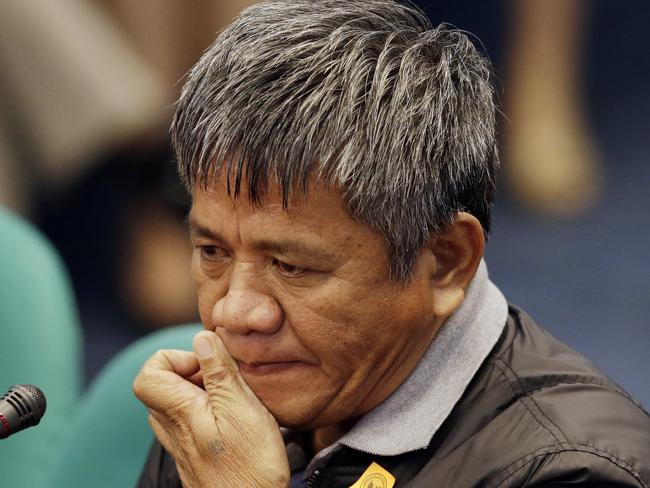
Duterte was elected president in May in a landslide victory, promising to kill 100,000 criminals within six months of taking power.
“The killings in Davao City started from 1988 to 2013,” Mr Matobato told the hearing.
“I think we have killed over 1000 people in Davao city alone.”
Mr Matobato revealed he carried out about 50 deadly assaults as an assassin, including a suspected kidnapper fed to a crocodile in 2007 in southern Davao del Sur province.
Human rights groups have long accused Duterte of involvement in death squads.
The president denies the claims, even while engaging in tough talk in which he stated his approach to criminals was to “kill them all”.
Mr Matobato is the first person to admit any role in such killings, and to directly implicate Duterte under oath in a public hearing.
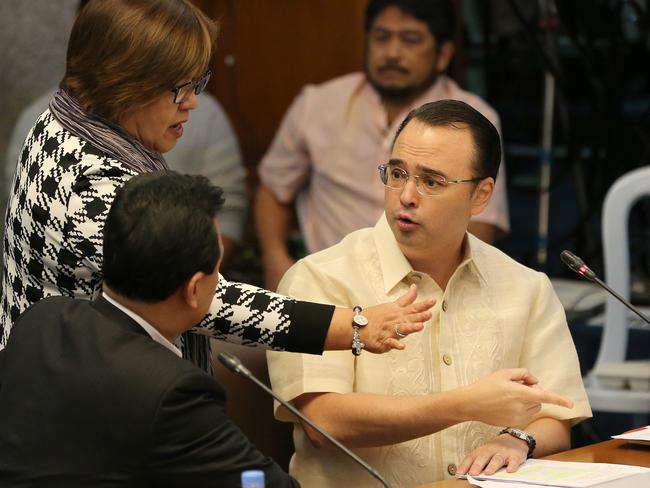
‘SERIOUS ALLEGATIONS’
Human Rights Watch have called on the Philippine government to order an independent investigation into the “very serious allegations” of direct involvement by Duterte “in extrajudicial killings”.
HRW Asia director Brad Adams said Duterte can’t be expected to investigate himself and it was crucial that the United Nations led such an effort.
“Otherwise, Filipinos may never know if the president was directly responsible for extrajudicial killings,” he said.
The Senate committee inquiry was led by Leila de Lima, a staunch critic of Duterte’s anti-drug campaign that has left more than 3000 suspected drug users and dealers dead since he assumed the presidency in June.
Ms de Lima revealed how she was even once a target, revealing the squad once ambushed her under Duterte’s orders but she never showed up.
Duterte accused Ms de Lima of involvement in illegal drugs, alleging that she used to have a driver who took money from detained drug lords. She has denied the allegations.
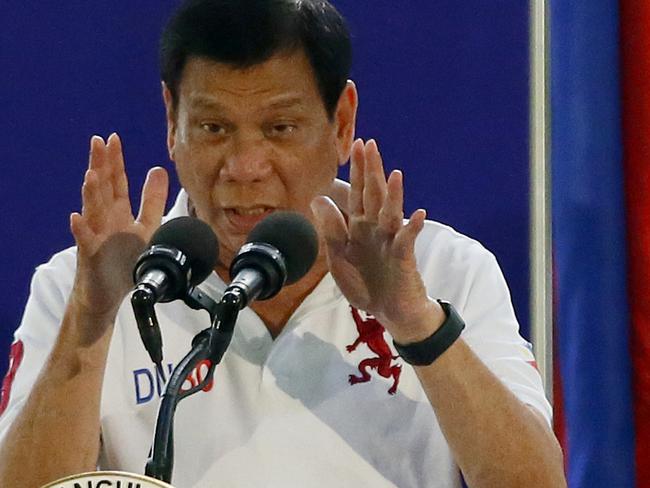
Mr Matobato said Duterte issued a kill order for her when she chaired the Commission on Human Rights and was investigating the mayor’s possible role in extrajudicial killings in 2009 in Davao.
He said he and others were waiting to ambush Ms de Lima but she did not go to a part of a hilly area — a suspected mass grave — where they were waiting to open fire.
“If you went inside the upper portion, we were already in ambush position,” Mr Matobato told Ms de Lima. “It’s good that you left.”
KILLINGS SHOCK
The recent killings of suspected drug dealers have sparked concerns in the Philippines and among UN and US officials, including President Barack Obama, who have urged Duterte’s government to take steps to rapidly stop them.
There are also calls to ensure his anti-drug war complies with human rights laws and the rule of law.
Duterte has rejected the criticisms, questioning the right of the UN, and President Obama to raise human rights issues, when US forces had massacred Muslims in the country’s south in the early 1900s as part of a pacification campaign.
Mr Matobato said under oath that the killings went on from 1988, when Duterte first became Davao city mayor, to 2013, when Mr Matobato said he expressed his desire to leave the death squad.
He said that prompted his colleagues to implicate him criminally in one killing to silence him.
“Our job was to kill criminals like drug pushers, rapists, snatchers. These are the kind we killed every day,” Mr Matobato said.
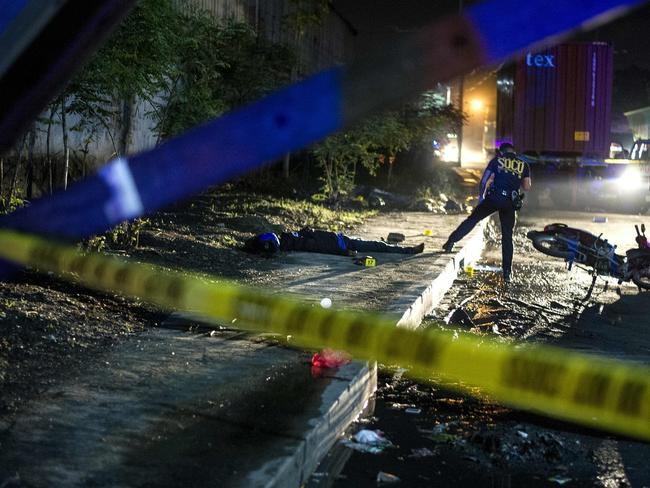
But he said their targets were not only criminals but also opponents of Duterte and one of his sons, Paolo Duterte, who is now the vice mayor of Davao.
Presidential spokesman Martin Andanar rejected the allegations, saying government investigations into Duterte’s time as mayor of Davao had already gone nowhere because of a lack of evidence and witnesses.
Philippine human rights officials and advocates have previously said potential witnesses refused to testify against Duterte when he was still mayor out of fear of being killed.
There was no immediate reaction from Duterte. Another Duterte spokesman, Ernesto Abella, said at a news conference that while Mr Matobato “may sound credible, it is imperative that each and every one of us properly weigh whatever he said and respond right”.
HIT LIST
Mr Matobato said the victims in Davao allegedly ranged from petty criminals to a wealthy businessman from central Cebu province who was killed in 2014 in his office in Davao city, allegedly because of a feud with Paolo Duterte over a woman.
The president’s son said the allegations were without proof and “are mere hearsay,” telling reporters he would “not dignify the accusations of a mad man.”
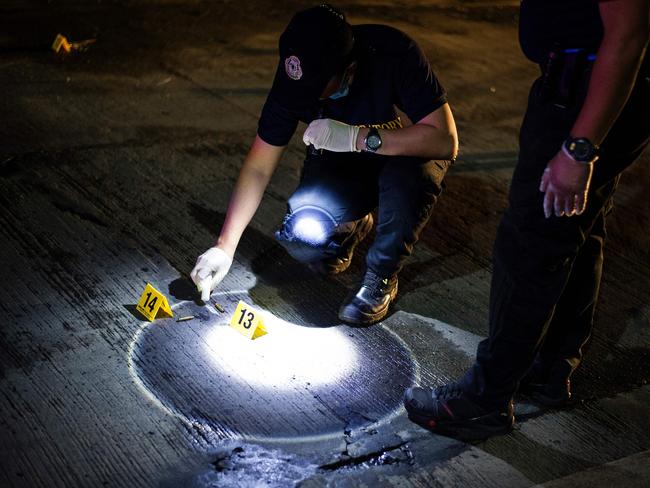
Other victims were a suspected foreign militant whom Mr Matobato said he strangled, then chopped into pieces and buried in a quarry in 2002.
Another was a radio commentator, Jun Pale, who was critical of Duterte and was killed by motorcycle-riding gunmen while walking home in 2003.
After a 1993 bombing of a Roman Catholic cathedral in Davao city, Mr Matobato said Duterte ordered him and his colleagues to launch attacks on mosques in an apparent retaliation.
He testified he hurled a grenade at one mosque but there were no casualties because the attacks were carried out when no one was praying.
“They were killed like chickens,” said Mr Matobato, who added he that backed away from the killings after feeling guilty and entered a government witness-protection program.
He left the protection program when Duterte became president, fearing he would be killed, and said he decided to surface now “so the killings will stop.”
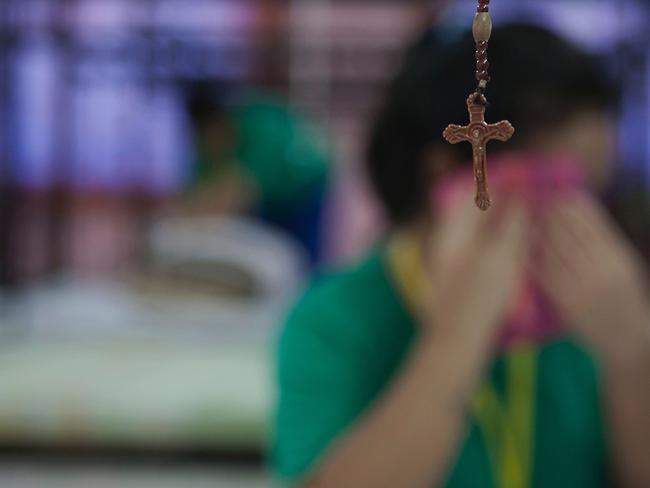
ALLEGATIONS DENIED
Mr Matobato’s testimony set off a tense exchange between pro-Duterte and opposition senators.
Senator Alan Peter Cayetano accused Mr Matobato of being part of a plot to unseat Duterte.
“I’m testing to see if you were brought here to bring down this government,” he said.
Ms de Lima eventually declared Mr Cayetano “out of order” and ordered Senate security personnel to restrain him.
Another senator, former national police chief Panfilo Lacson, warned Mr Matobato that his admissions that he was involved in killings could land him in jail.
“You can be jailed with your revelations,” Mr Lacson said. “You have no immunity.”
Duterte has immunity from lawsuits as a president, but Ms de Lima said that principle may have to be revisited now. “What if a leader is elected and turns out to be a mass murderer?” Ms de Lima asked in a news conference after the tense Senate hearing.



